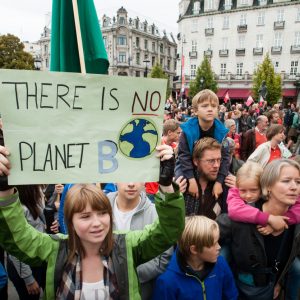By Avi Lewis, published by The Leap: System Change on a Deadline, October 10, 2018
More and more people are coming to the conclusion that this escalating crisis, everharder to deny, can galvanize change on the scale that is really needed. Nothing less will do.
The new Intergovernmental Panel on Climate Change report is out, and it is a dramatic development. The threat advisory from the world’s scientific climate community just went from orange to flashing red.
But here’s the key takeaway: limiting warming to 1.5 degrees Celsius is still possible, and will require a rapid transformation of our economy. The great news is that this need for fundamental change is now recognized by the world’s leading climate scientists, who advise the United Nations. And as we’ve been arguing for years, the wider opportunities and benefits of that unprecedented transition are vast: a global green new deal, millions of new jobs, deep change anchored in justice.
The call to action in this report is why we started The Leap. Transforming our economy and society on the scale this crisis requires is the most powerful opportunity we’ve ever had to build a more caring, live-able planet.
So don’t look away. While the understandable reaction is to avoid, avoid, avoid (hey, we have this feeling too!) we find relief in engaging with the facts. Here are three takeaways from The Leap on this unprecedented UN report.
1. Don’t doubt what your senses are telling you.
Yes, the climate crisis is unfolding even faster and more furiously than expected. At current emissions rates, we could hit 1.5°C of global warming as soon as 2030 – and we’re on track for far more. If that happens, the worst impacts of climate change – previously predicted to take place closer to the end of the century – will likely begin within our lifetime. Food and water shortages across the globe. The death of all coral reefs. Hundreds of millions of people impacted by deadly heat or rising waters. And a predicted economic cost counted in tens of trillions of dollars. Trillions. Overall, the more than 6,000 scientific papers behind this report are telling us that 1.5°C is more dangerous than previously predicted, and it’s all happening sooner than we thought. We have less than a decade to turn our global emissions trends around.
2. Beware of doom merchants.
After this report, get ready to start hearing two new angles from pundits and deniers. First, that we’re doomed anyways, so…let’s not do anything at all. We got a first glimpse of this tactic in August, from the Trump administration. In a draft environmental impact statement, it argued that warming of 4°C is indeed on its way – so the fact that the administration was axing fuel efficiency standards for cars and light trucks didn’t really matter.
The second take we can expect to hear more of is the idea of the “moonshot.” That things are so dire that it’s time to start radical climate experiments, or “geo-engineering” to counteract global warming. These sci-fi schemes include terrifying ideas like dimming the sun by releasing sulfur into the upper atmosphere.
The good news is: this report doesn’t back such doomsday approaches. It warns against the substantial risks of untested geoengineering strategies. And it is up front about the fact that while the situation is dire – responses based on hopelessness are not what we need.
3. We can still turn this around. And it’s going to take a leap.
With this report, the UN has suddenly reached the very realization that gave rise to The Leap Manifesto in 2015: the only thing that can save us now is the total transformation of our political and economic system. Of course, there’s a clear implication of this fact that the UN is not yet ready to admit: system change requires taking power away from the people most responsible for this crisis, from bringing about a managed decline of the fossil fuel industry to bringing the high-emitting billionaire class down to earth.
Consider, for some perspective, this take from climate and energy expert Kevin Anderson: “almost 50% of global carbon emissions arise from the activities of around 10% of the global population…. Impose a limit on the per-capita carbon footprint of the top 10% of global emitters, equivalent to that of an average European citizen, and global emissions could be reduced by one third in a matter of a year or two.”
Of course, cracking down on the emissions of the high-carbon global class would not be that simple – but instead of wasting another decade on market-friendly tweaks and silver bullet technologies, we certainly can mobilize for real, democratic control over every part of our economies.
This is the most hopeful note: more and more people are coming to the conclusion that this escalating crisis, ever-harder to deny, can galvanize change on the scale that is really needed. Nothing less will do. The idea of a “Green New Deal” is gaining momentum around the world.
This is white-knuckle terrifying stuff, but don’t turn away: the report makes clear that the worst effects of global warming can still be prevented, and the urgency of transformative change should excite and empower all of us who are fighting for justice anyway.
This is a time to use our fear as fuel, and ratchet up our determination. Let’s take a good, hard, clear-eyed look at the fucked-up future we are headed for, and decide – collectively – to leap to a safer, better place.
Avi Lewis is an award winning documentary filmmaker and long-time television journalist. His films include The Take and This Changes Everything. He is one of the coauthors of the Leap Manifesto and is the Strategic Director and Co-Founder of The Leap.
Our Comment
If we do not fear climate change, it’s because we don’t know enough about it. So, the first step is to learn the truth about it, and to share that information with others.
We are lucky in organizations like The Leap, that have contributed so much to the growing level of awareness on the issue.
Fear, of course, can freeze you in your tracks, or it can inspire you to life-saving action. What makes the difference, is hope. As Avi Lewis has pointed out, the IPCC report incites both fear and hope.
Lewis’ call to action is an invitation. Anyone not yet involved might find The Leap a great way to begin.
Élan








